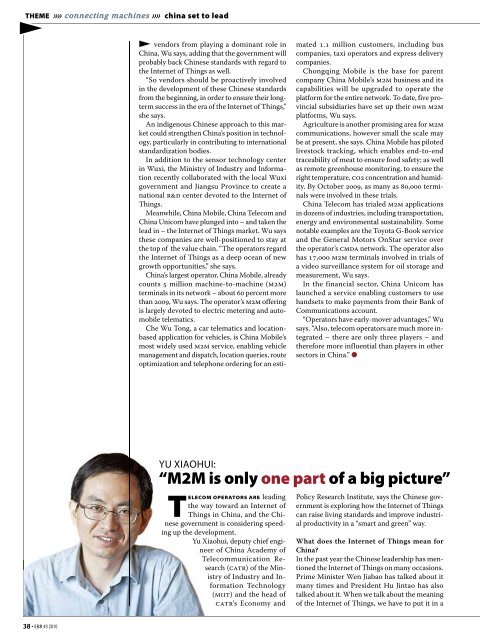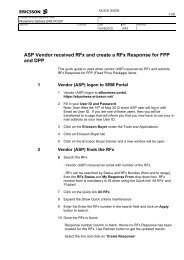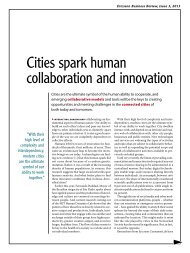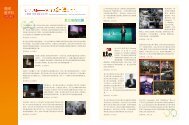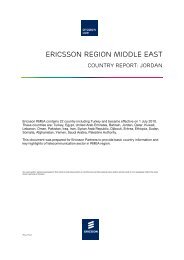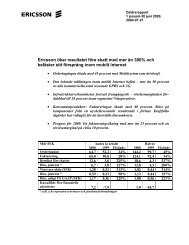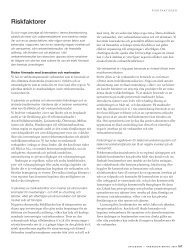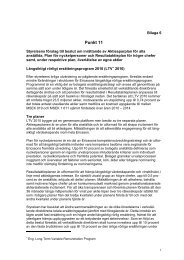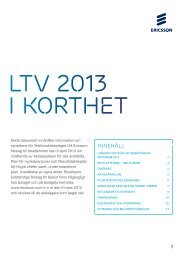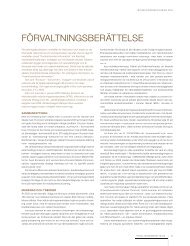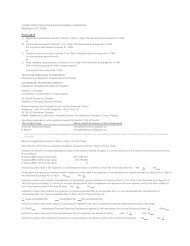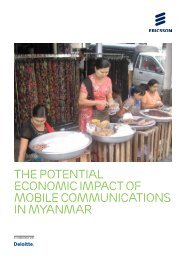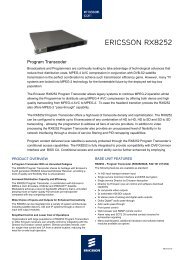Telenor's - Ericsson
Telenor's - Ericsson
Telenor's - Ericsson
- TAGS
- ericsson
- www.ericsson.com
You also want an ePaper? Increase the reach of your titles
YUMPU automatically turns print PDFs into web optimized ePapers that Google loves.
THEME »» connecting machines »» china set to lead<br />
▶<br />
vendors from playing a dominant role in<br />
China, Wu says, adding that the government will<br />
probably back Chinese standards with regard to<br />
the Internet of Things as well.<br />
“So vendors should be proactively involved<br />
in the development of these Chinese standards<br />
from the beginning, in order to ensure their longterm<br />
success in the era of the Internet of Things,”<br />
she says.<br />
An indigenous Chinese approach to this market<br />
could strengthen China’s position in technology,<br />
particularly in contributing to international<br />
standardization bodies.<br />
In addition to the sensor technology center<br />
in Wuxi, the Ministry of Industry and Information<br />
recently collaborated with the local Wuxi<br />
government and Jiangsu Province to create a<br />
national r&d center devoted to the Internet of<br />
Things.<br />
Meanwhile, China Mobile, China Telecom and<br />
China Unicom have plunged into – and taken the<br />
lead in – the Internet of Things market. Wu says<br />
these companies are well-positioned to stay at<br />
the top of the value chain. “The operators regard<br />
the Internet of Things as a deep ocean of new<br />
growth opportunities,” she says.<br />
China’s largest operator, China Mobile, already<br />
counts 5 million machine-to-machine (m2m)<br />
terminals in its network – about 60 percent more<br />
than 2009, Wu says. The operator’s m2m offering<br />
is largely devoted to electric metering and automobile<br />
telematics.<br />
Che Wu Tong, a car telematics and locationbased<br />
application for vehicles, is China Mobile’s<br />
most widely used m2m service, enabling vehicle<br />
management and dispatch, location queries, route<br />
optimization and telephone ordering for an esti-<br />
38 EBR #3 2010<br />
TELECOM OPERATORS ARE leading<br />
the way toward an Internet of<br />
Things in China, and the Chinese<br />
government is considering speeding<br />
up the development.<br />
Yu Xiaohui, deputy chief engineer<br />
of China Academy of<br />
Telecommunication Research<br />
(catr) of the Ministry<br />
of Industry and Information<br />
Technology<br />
(miit) and the head of<br />
catr’s Economy and<br />
mated 1.1 million customers, including bus<br />
companies, taxi operators and express delivery<br />
companies.<br />
Chongqing Mobile is the base for parent<br />
company China Mobile’s m2m business and its<br />
capabilities will be upgraded to operate the<br />
platform for the entire network. To date, five provincial<br />
subsidiaries have set up their own m2m<br />
platforms, Wu says.<br />
Agriculture is another promising area for m2m<br />
communications, however small the scale may<br />
be at present, she says. China Mobile has piloted<br />
livestock tracking, which enables end-to-end<br />
traceability of meat to ensure food safety; as well<br />
as remote greenhouse monitoring, to ensure the<br />
right temperature, co2 concentration and humidity.<br />
By October 2009, as many as 80,000 terminals<br />
were involved in these trials.<br />
China Telecom has trialed m2m applications<br />
in dozens of industries, including transportation,<br />
energy and environmental sustainability. Some<br />
notable examples are the Toyota G-Book service<br />
and the General Motors OnStar service over<br />
the operator’s cmda network. The operator also<br />
has 17,000 m2m terminals involved in trials of<br />
a video surveillance system for oil storage and<br />
measurement, Wu says.<br />
In the financial sector, China Unicom has<br />
launched a service enabling customers to use<br />
handsets to make payments from their Bank of<br />
Communications account.<br />
“Operators have early-mover advantages,” Wu<br />
says. “Also, telecom operators are much more integrated<br />
– there are only three players – and<br />
therefore more influential than players in other<br />
sectors in China.” ●<br />
YU XIAOHUI:<br />
“M2M is only one part of a big picture”<br />
Policy Research Institute, says the Chinese government<br />
is exploring how the Internet of Things<br />
can raise living standards and improve industrial<br />
productivity in a “smart and green” way.<br />
What does the Internet of Things mean for<br />
China?<br />
In the past year the Chinese leadership has mentioned<br />
the Internet of Things on many occasions.<br />
Prime Minister Wen Jiabao has talked about it<br />
many times and President Hu Jintao has also<br />
talked about it. When we talk about the meaning<br />
of the Internet of Things, we have to put it in a


